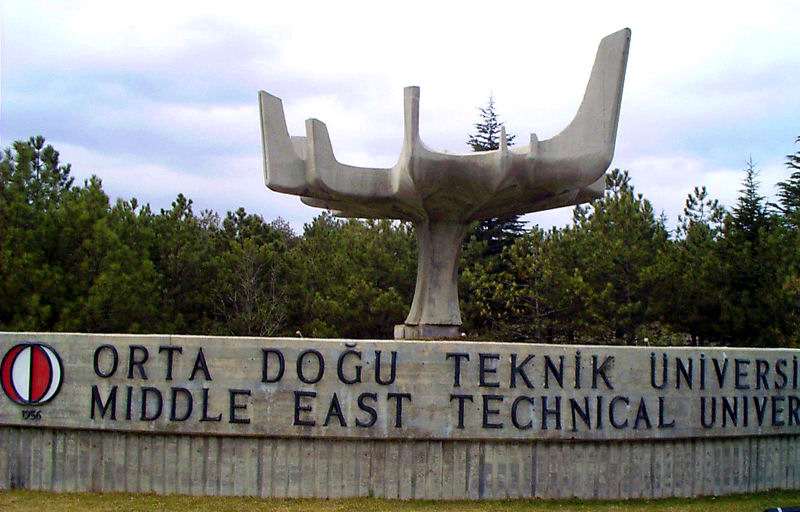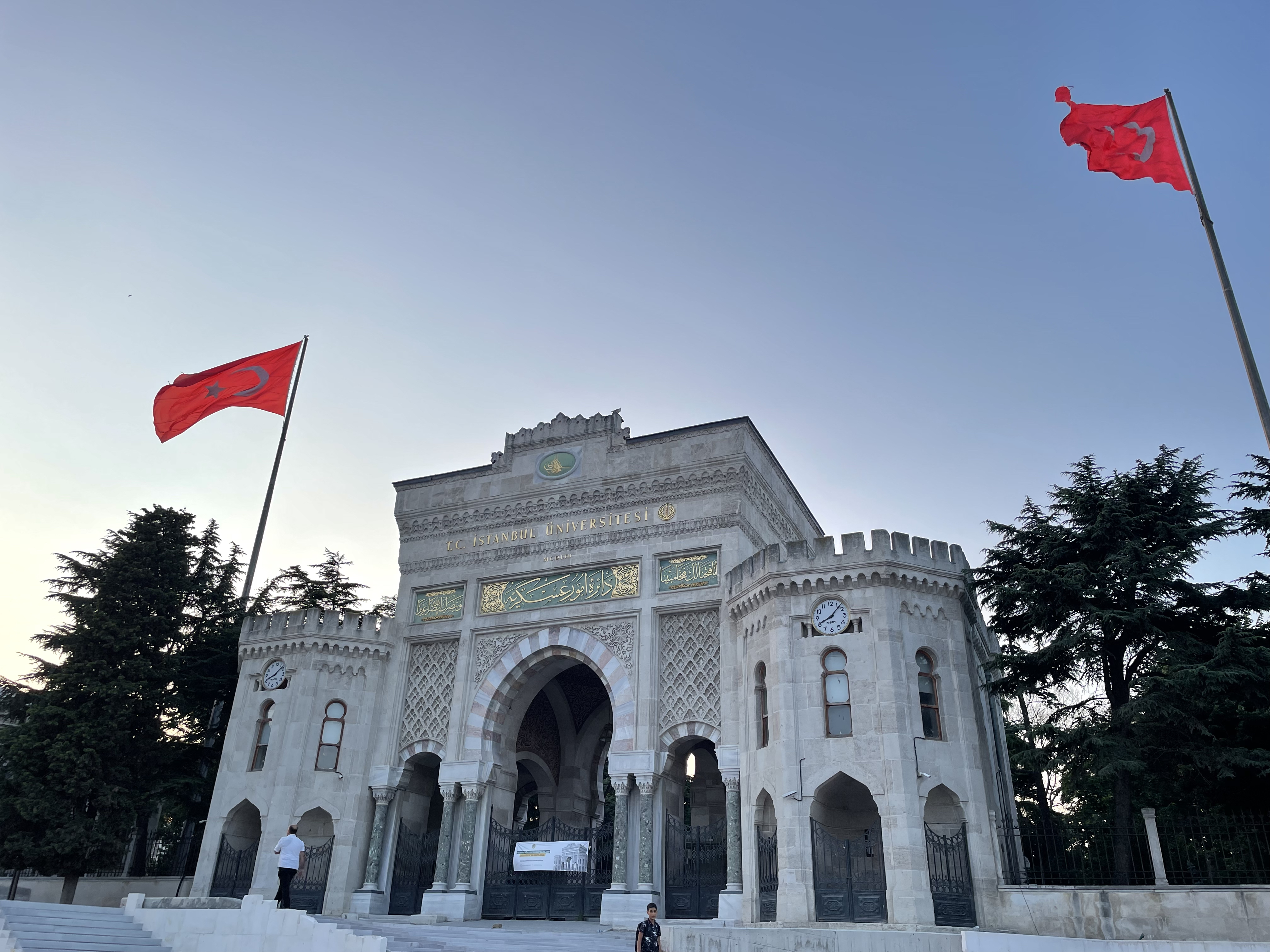|
Ankara Hacı Bayram Veli University
Ankara Hacı Bayram Veli University, shortened AHBV, is a public university in Turkey which was formed on 18 May 2018 by the separation from Gazi University. Some faculties which have been separated from Gazi University in accordance with the law no 7141 such as Gazi University Faculty of Law, Faculty of Economics and Administrative Sciences, Faculty of Letters have been become a part of newly established Ankara Hacı Bayram Veli University. The ''Besevler Campus'' is located in the city center of Ankara, the capital city of Turkey. Besevler Campus, which has the Faculty of Law and Faculty of Economics and Administrative Sciences, has graduated many famous people who are active in Turkish politics. Kemal Kılıçdaroğlu of the Republican People's Party, the leader of the main opposition party in the Turkish Grand National Assembly, and Devlet Bahçeli, the leader of the Nationalist Movement Party, have graduated from the aforementioned Faculty of Economics and Administrative Scien ... [...More Info...] [...Related Items...] OR: [Wikipedia] [Google] [Baidu] |
Gazi University
Gazi University () is a Public university, public research university located primarily in Ankara, Turkey. It was founded in 1926 by Mustafa Kemal Atatürk originally as the Gazi Education Institute (Turkish language, Turkish: ''Gazi Eğitim Enstitüsü''), has evolved into a comprehensive institution. The university comprises 21 faculties, 4 schools, 11 vocational schools of higher education, 52 research centers, and 7 graduate institutes. As of the latest data, the total student population is approximately 77,000, with around 1,500 students originating from the Turkic states of Central Asia. Additionally, 5,000 students are engaged in various graduate programs. The university employs over 3,000 faculty members, contributing to its extensive academic community. Campus Gazi University operates as a ''city-university'' with multiple campuses throughout the capital, with its main campus in Beşevler. Its urban setting facilitates access to housing and shopping centers for studen ... [...More Info...] [...Related Items...] OR: [Wikipedia] [Google] [Baidu] |
Public University
A public university, state university, or public college is a university or college that is State ownership, owned by the state or receives significant funding from a government. Whether a national university is considered public varies from one country (or region) to another, largely depending on the specific education landscape. In contrast a private university is usually owned and operated by a private corporation (not-for-profit or for profit). Both types are often regulated, but to varying degrees, by the government. Africa Algeria In Algeria, public universities are a key part of the education system, and education is considered a right for all citizens. Access to these universities requires passing the Baccalaureate (Bac) exam, with each institution setting its own grade requirements (out of 20) for different majors and programs. Notable public universities include the Algiers 1 University, University of Algiers, Oran 1 University, University of Oran, and Constantin ... [...More Info...] [...Related Items...] OR: [Wikipedia] [Google] [Baidu] |
Ankara
Ankara is the capital city of Turkey and List of national capitals by area, the largest capital by area in the world. Located in the Central Anatolia Region, central part of Anatolia, the city has a population of 5,290,822 in its urban center (Etimesgut, Yenimahalle, Çankaya District, Çankaya, Keçiören, Altındağ, Pursaklar, Mamak, Ankara, Mamak, Gölbaşı, Ankara, Gölbaşı, Sincan, Ankara, Sincan) and 5,864,049 in Ankara Province (total of 25 districts). Ankara is Turkey's List of cities in Turkey, second-largest city by population after Istanbul, first by urban land area, and third by metro land area after Konya and Sivas. Ankara was historically known as Ancyra and Angora. Serving as the capital of the ancient Celts, Celtic state of Galatia (280–64 BC), and later of the Roman Empire, Roman province with the Galatia (Roman province), same name (25 BC–7th century), Ankara has various Hattians, Hattian, Hittites, Hittite, Lydian, Phrygian, Galatians (people ... [...More Info...] [...Related Items...] OR: [Wikipedia] [Google] [Baidu] |
Kemal Kılıçdaroğlu
Kemal Kılıçdaroğlu (; born 17 December 1948), also referred to by his initials KK, is a Turkish politician who served as the Leader of the Republican People's Party, leader of the Republican People's Party (CHP) from 2010 to 2023. He was List of the Main Opposition Leaders of Turkey, Leader of the Main Opposition in Politics of Turkey, Turkey between 2010 and 2023. He served as a Member of Parliament#Turkey, member of Grand National Assembly of Turkey, parliament for Istanbul (electoral districts), Istanbul's Istanbul (2nd electoral district), second electoral district from 2002 to 2015, and as an MP for İzmir (electoral districts), İzmir's İzmir (2nd electoral district), second electoral district from 2015 to 2023. Before entering politics, Kılıçdaroğlu was a civil servant and served as the director-general of the Social Security Institution from 1992 to 1996 and again from 1997 to 1999. He was elected to Parliament in the 2002 Turkish general election, 2002 general e ... [...More Info...] [...Related Items...] OR: [Wikipedia] [Google] [Baidu] |
Republican People's Party
The Republican People's Party (RPP; , CHP ) is a Kemalism, Kemalist and Social democracy, social democratic political party in Turkey. It is the oldest List of political parties in Turkey, political party in Turkey, founded by Mustafa Kemal Atatürk, the List of presidents of Turkey, first president and founder of the modern Turkey, Republic of Türkiye. The party is also cited as the founding party of modern Turkey. Its logo consists of the The Six Arrows, Six Arrows, which represent the foundational principles of Kemalism: republicanism, reformism, Secularism in Turkey, laicism, populism, nationalism, and statism. It is currently the second largest party in Grand National Assembly of Turkey, Grand National Assembly with 135 MPs, behind the ruling conservative Justice and Development Party (Turkey), Justice and Development Party (AKP). The political party has its origins in the various Association for Defence of National Rights, resistance groups founded during the Turkish W ... [...More Info...] [...Related Items...] OR: [Wikipedia] [Google] [Baidu] |
Turkish Grand National Assembly
The Grand National Assembly of Turkey ( ), usually referred to simply as the GNAT or TBMM, also referred to as , in Turkish, is the unicameral Turkish legislature. It is the sole body given the legislative prerogatives by the Turkish Constitution. It was founded in Ankara on 23 April 1920 amid the National Campaign. This constitution had founded its pre-government known as 1st Executive Ministers of Turkey (Commitment Deputy Committee) in May 1920. The parliament was fundamental in the efforts of '' Mareşal'' Mustafa Kemal Atatürk, 1st President of the Republic of Turkey, and his colleagues to found a new government out of the remnants of the Ottoman Empire. Composition There are 600 members of parliament (deputies) who are elected for a five-year term by the D'Hondt method, a party-list proportional representation system, from 87 electoral districts which represent the 81 administrative provinces of Turkey (Istanbul and Ankara are divided into three electoral dis ... [...More Info...] [...Related Items...] OR: [Wikipedia] [Google] [Baidu] |
Devlet Bahçeli
Devlet Bahçeli (born 1 January 1948) is a Turkish people, Turkish politician, economist, former Deputy Prime Minister of Turkey, deputy prime minister, and current chairman of the Far-right politics, far-right, Ultranationalism, ultranationalist Nationalist Movement Party (MHP). An academic in economics from Gazi University, Bahçeli is a founder of the Grey Wolves, and was elected as the chairman of the MHP in the first congress held after the death of Alparslan Türkeş in 1997. He entered Grand National Assembly of Turkey, parliament for the first time in the 1999 Turkish general election, 1999 general election as a deputy from Osmaniye (electoral district), Osmaniye, taking part as deputy prime minister in 57th government of Turkey, DSP-MHP-ANAP coalition between 1999 and 2002, and ultimately brought the government down. He resigned from his position as chairman when his party fell below the 10% electoral threshold in the 2002 Turkish general election, 2002 general electi ... [...More Info...] [...Related Items...] OR: [Wikipedia] [Google] [Baidu] |
Nationalist Movement Party
The Nationalist Movement Party, or alternatively translated as Nationalist Action Party (, MHP), is a Turkish Far-right politics, far-right, ultranationalism, ultranationalist Political parties in Turkey, political party. The group is often described as Neo-fascism, neo-fascist, and has been linked to violent paramilitaries and Turkish mafia, organized crime groups. Its leader is Devlet Bahçeli. The party was formed in 1969 by former Turkish Army colonel Alparslan Türkeş, who had become leader of the Republican Villagers Nation Party (CKMP) in 1965. The party mainly followed a Pan-Turkism, Pan-Turkist and Turkish nationalist political agenda throughout the latter half of the 20th century. Devlet Bahçeli took over after Türkeş's death in 1997. The party's youth wing is the Grey Wolves (organization), Grey Wolves (''Bozkurtlar'') organization, which is also known as the "Nationalist Hearths" (''Ülkü Ocakları'') which played one of the biggest roles during the Political v ... [...More Info...] [...Related Items...] OR: [Wikipedia] [Google] [Baidu] |
List Of Universities In Ankara
This list of universities in Ankara lists the universities within the city limits of Ankara. Public universities Private universities Former universities See also * List of universities in Istanbul * List of universities in İzmir * List of universities in Turkey * Education in Turkey References {{DEFAULTSORT:Universities Universities A university () is an educational institution, institution of tertiary education and research which awards academic degrees in several Discipline (academia), academic disciplines. ''University'' is derived from the Latin phrase , which roughly ... Universities in Ankara ... [...More Info...] [...Related Items...] OR: [Wikipedia] [Google] [Baidu] |
List Of Universities In Turkey
This is a list of universities in Turkey. There are 208 university, universities and academies in total: 129 Public university, public universities (eleven Technical University, technical universities, one Institute of technology, institutes of technology, and two fine arts university, one Milli Savunma University, national defense university, and one police academy), 75 Private university#Turkey, private foundation universities, four two-year granting institutions. Listing by location (provinces) Further education Former / Closed International rankings According to the ''Times Higher Education World University Rankings'': See also * Ahmet Yesevi University, Hoca Ahmet Yesevi Turkish Kazakh University * Manas University, Kyrgyzstan-Turkey Manas University References External linksStudy in Turkeyofficial websiteCouncil of Higher Education (YOK) {{Universities in Turkey, state=expanded Universities and colleges in Turkey, * Turkey education-related l ... [...More Info...] [...Related Items...] OR: [Wikipedia] [Google] [Baidu] |
Universities And Colleges In Ankara
A university () is an institution of tertiary education and research which awards academic degrees in several academic disciplines. ''University'' is derived from the Latin phrase , which roughly means "community of teachers and scholars". Universities typically offer both undergraduate and postgraduate programs. The first universities in Europe were established by Catholic monks. The University of Bologna (), Italy, which was founded in 1088, is the first university in the sense of: *being a high degree-awarding institute. *using the word (which was coined at its foundation). *having independence from the ecclesiastic schools and issuing secular as well as non-secular degrees (with teaching conducted by both clergy and non-clergy): grammar, rhetoric, logic, theology, canon law and notarial law.Hunt Janin: "The university in medieval life, 1179–1499", McFarland, 2008, , p. 55f.de Ridder-Symoens, Hilde''A History of the University in Europe: Volume 1, Universities in the Middl ... [...More Info...] [...Related Items...] OR: [Wikipedia] [Google] [Baidu] |
Universities And Colleges Established In 2017
A university () is an educational institution, institution of tertiary education and research which awards academic degrees in several Discipline (academia), academic disciplines. ''University'' is derived from the Latin phrase , which roughly means "community of teachers and scholars". Universities typically offer both undergraduate education, undergraduate and postgraduate education, postgraduate programs. The first universities in Europe were established by Catholic Church, Catholic monks. The University of Bologna (), Italy, which was founded in 1088, is the first university in the sense of: *being a high degree-awarding institute. *using the word (which was coined at its foundation). *having independence from the ecclesiastic schools and issuing secular as well as non-secular degrees (with teaching conducted by both clergy and non-clergy): grammar, rhetoric, logic, theology, canon law and notarial law.Hunt Janin: "The university in medieval life, 1179–1499", McFarland, 2 ... [...More Info...] [...Related Items...] OR: [Wikipedia] [Google] [Baidu] |










